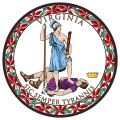
The Virginia Marine Resources Commission is a state agency charged with overseeing Virginia's marine and aquatic resources, and its tidal waters and homelands. [1] One of the primary functions of the Commission is to zone water areas for outdoor swimming, for oyster and clamming grounds, and for fishing use. [2]
